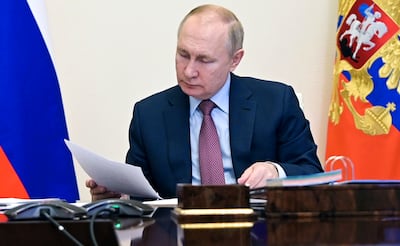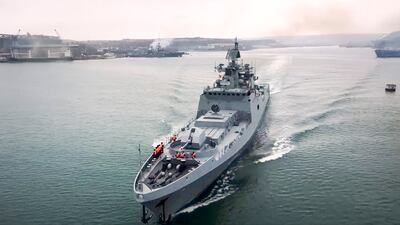Russia has threatened to retaliate if the West fails to respond to Moscow’s security demands and continues “its aggressive course” after weeks of tension over the build-up of troops on the country's eastern border.
French officials were hosting representatives of Russia and Ukraine, plus German diplomats, on Wednesday in a resumption of a direct dialogue that was regarded by Paris as holding out faint hope of a thaw.
"It's very encouraging that the Russians agreed to enter into this diplomatic format again," an aide to French President Emmanuel Macron said on Wednesday.
Russian Foreign Minister Sergey Lavrov also kept the door open to dialogue but he told Russia’s Duma that “we won't allow our proposals to be drowned in endless discussions”.
“If there is no constructive answer and if the West continues its aggressive course, Moscow, as [Russian President Vladimir Putin] has repeatedly said, will take the necessary retaliatory measures,” Mr Lavrov said.
“Depending on the content of these replies, which, I repeat, we expect this week, together with our colleagues from other institutions, we will bring proposals with the next steps to our president.”
He also accused the West of being “after some kind of provocation".
The 100,000 Russian troops on its border with Ukraine has led to fears in some western capitals that an invasion is imminent, despite Moscow's denial of such a possibility.
Senior officials from Russia, Ukraine, France and Germany met in Paris on Wednesday in the latest diplomatic push.
The “Normandy format” was attended by the Kremlin's deputy chief of staff Dmitry Kozak and senior Ukrainian presidential adviser Andriy Yermak, alongside French and German officials.
The talks were “a strong signal of readiness for a peaceful settlement”, said Mr Yermak.

Security proposals by Russia have been rejected by Nato but there have been a succession of high-level diplomatic talks between the sides as they try to make headway on the main stumbling blocks.
Among those demands are a guarantee that Nato will never admit Ukraine as a member and that the military alliance will remove troops in other former Soviet bloc nations.
While Ukraine is not a member of Nato or the EU, organisations and member states have stood behind it and threatened Moscow with heavy economic sanctions if an invasion takes place.
Ukrainian Foreign Minister Dmytro Kuleba said on Wednesday that the number of Russian troops “is insufficient for a full-scale offensive” but does pose “a direct threat” to Ukraine.
European Council President Charles Michel said on Wednesday: “A threat against Ukraine is a threat against Europe.”
Nato this week further reinforced its positions in Eastern Europe in preparation for a potential conflict.
Nato member Romania also said on Wednesday that it was in talks with the US and France to host more troops from the military alliance.
French Foreign Minister Jean-Yves Le Drian told the French Senate that Europe and the US were working hard to find a diplomatic solution.
“The Ukraine situation is very tense but we are taking all the necessary initiatives to trigger a de-escalation process,” he said.
Mr Macron is to hold phone calls with Russian and Ukrainian leaders Mr Putin and Volodymyr Zelenskiy in the coming days.

“We have always been clear about the fact that dialogue must be pursued. It is obviously one of the conditions of de-escalation, which doesn't prevent working on dissuasive sanctions at the same time,” said French government spokesman Gabriel Attal.
“That's what we are doing within the European framework, with our American partners and within the Nato framework, in order to be clear that there would be major consequences and a high price for Russia if there was to be a new incursion in Ukraine.
“So, the first objective is the pursuance of dialogue, and the second objective of this call is to push Russia to clarify its position and the purpose of the deployed manoeuvres on this topic.”
After the meeting, advisers to the heads of state of Russia, Ukraine, France and Germany issued a joint statement reaffirming their commitment to uphold a ceasefire agreed to in the Minsk accords.
"They support unconditional compliance with the ceasefire regardless of differences on other issues related to the implementation of the Minsk agreements," the statement published on the website of the French presidency said.
During Wednesday's talks, Russia criticised reports that countries including the US could impose sanctions on Mr Putin.
Kremlin spokesman Dmitry Peskov said such a move would be pointless because senior Russian officials are barred from holding assets abroad. But he said that it would only worsen tension.
“Politically, it's not painful, it's destructive,” he said.
Foreign Secretary Liz Truss told BBC Radio 4 on Wednesday that the UK was not ruling out support for personal sanctions against Mr Putin in the event of a Russian incursion.
“We have ruled nothing out in terms of sanctions, and in fact we’ll be legislating to toughen up our sanctions regime and make sure we are fully able to hit both individuals and companies, and banks, in Russia in the event of an incursion,” Ms Truss said.
“What’s important is that all of our allies do the same, because it’s by collective action, by showing Vladimir Putin we’re united, that we will help deter a Russian incursion.”
Earlier, Ms Truss called on the UK’s allies to “do more” to support Ukraine.
“We would like to see our allies do more to help supply defensive support to Ukraine and also put those sanctions in place," she said.
“We have made huge progress. I hosted the G7 in Liverpool in December and all of the G7 agreed that there would be severe economic costs if Vladimir Putin invades Ukraine.”
Ms Truss told Sky News that Russia would face “severe sanctions” if an incursion into Ukraine took place.
“We are already supplying support to Ukraine. We’re supplying defensive weapons. We’re providing economic support,” she said.
“We are urging Russia to desist from an incursion and we’re making it very clear that if they were to do that there would be severe economic cost to Russia – severe sanctions.
“They would target individuals, they would target financial institutions and they would be co-ordinated with all of our allies across Europe, the United States and others.”
UK Prime Minister Boris Johnson said on Tuesday that Britain was prepared to send troops to protect Nato allies in Europe should Russia invade Ukraine, as he warned Mr Putin faced “ferocious” Ukrainian resistance.
Ms Truss said: “We already deploy troops in Estonia as part of our enhanced forward presence. We are looking at what more we can do. We’re working very closely with allies.
“I had a meeting with the Nato secretary general in Brussels earlier this week to discuss that, but the UK is already at the forefront of providing forces in Estonia and providing broader support across eastern Europe.
“But be in no doubt, Nato is determined to increase support on the eastern flank to support our Nato allies, who of course we have strong obligations to.”
Later on Wednesday, The Telegraph quotes sources as saying the UK was considering sending hundreds of troops to Eastern Europe.
Government sources said “very advanced discussions” were under way after reports emerged from Washington that the US, UK and a handful of Nato allies were in talks about bolstering their military presence on the coalition’s eastern flank, The Telegraph reported.
It is thought that a public announcement on new troop pledges from a smaller group of partners within the alliance could come as soon as Thursday, the report said.


